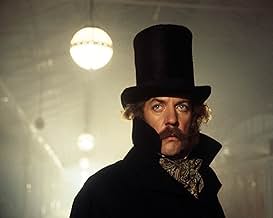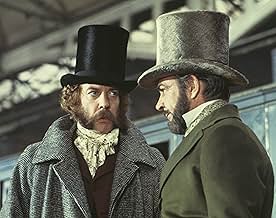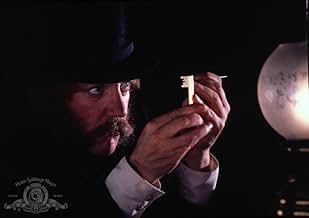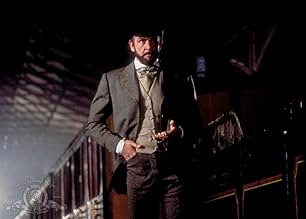VALUTAZIONE IMDb
6,9/10
20.086
LA TUA VALUTAZIONE
Inghilterra, 1850. Un maestro criminale mira a derubare un treno di una grossa somma d'oro. La sicurezza è incredibilmente stretta e il compito sembra impossibile.Inghilterra, 1850. Un maestro criminale mira a derubare un treno di una grossa somma d'oro. La sicurezza è incredibilmente stretta e il compito sembra impossibile.Inghilterra, 1850. Un maestro criminale mira a derubare un treno di una grossa somma d'oro. La sicurezza è incredibilmente stretta e il compito sembra impossibile.
- Premi
- 1 vittoria e 1 candidatura
Brian de Salvo
- John - Trent's Butler
- (as Brian De Salvo)
André Morell
- Judge
- (as Andre Morell)
Trama
Lo sapevi?
- QuizWriter and director Michael Crichton based his book and movie, only loosely on the actual crime committed in 1855. In real-life, there were four criminals: Pierce, Agar, the railway guard Burgess, and a railway clerk named Tester. All four keys were kept on railway premises, two in London, and two in Folkestone. They were stolen temporarily by Tester and Pierce, respectively, so that Agar could duplicate them, but it turned out that the Folkestone keys were not being used anyway. The guard's van was not locked from the outside; Pierce and Agar were let in by Burgess, and a share of the loot was handed out to Tester, at stations. None of the criminals were spotted at once; it was several months before the railway conceded that the crime must have occurred on the train. The details came to light after Agar had been convicted in an unrelated crime, and his accomplices decided to steal his share instead of using it, as he had asked, to provide his mistress an income. She got word to him, and he turned Queen's Evidence against the others, and told all. At no point in the case, did anyone escape from custody.
- BlooperIf the gold shipment was solely to pay British soldiers in Crimea, as asserted, it would have been in the form of barrels of gold coins, not gold bars as shown.
- Citazioni
Judge: [Judgementally] Now, on the matter of motive, we ask you: Why did you conceive, plan and execute this dastardly and scandalous crime?
Edward Pierce: I wanted the money.
[the court spectators roar with laughter]
- Curiosità sui creditiCóras Iompair Éireann is misspelled in the end titles with an accent over the 'C' instead of the 'o'.
- Versioni alternativeUnder the terms of the Cinematograph Films (Animals) Act 1937 all UK versions of the film are cut by 32 secs with edits to a scene where a dog hunts and kills rats in a show arena ('ratting').
- Colonne sonoreI Dreamt I Dwelt in Marble Halls
(uncredited)
Music by Michael William Balfe
Lyrics by Alfred Bunn (1843)
Heard on violin offstage in bordello
Recensione in evidenza
The First Great Train Robbery is directed by Michael Crichton who also writes the screenplay. It stars Sean Connery, Donald Sutherland, Lesley-Anne Down, Wayne Sleep, Robert Lang, Alan Webb and Andre Morell. Music is scored by Jerry Goldsmith and cinematography by Geoffrey Unsworth. The story is loosely based on the real Great Gold Robbery of 1855, where a rogue criminal named William Pierce and his cohorts executed the theft of £12,000 in gold from a speeding train on route to aid the British Army during the Crimean War.
A delightful period caper picture that's high on production value and fun characterisations. Split into two halves, Crichton's movie makes light of the actual crime to portray Connery and co as lovable rogues, thus hooking the viewer in to actually root for them to pull off the intricate crime. First half (well it's more two thirds of the film to be exact) details how the robbers obtained the four keys needed to get into the safe. Harder than it sounds since they are in different locations to one and other and guarded over by different officials. Naturally there are scrapes, skirmishes and obstacles to overcome during this complex operation, and no short amount of humour and tension either. Then it's on to the actual crime, which buzzes ferociously with derring do and ingenious cheek! It may have been loaded with chitter chatter and much bluffing of the way leading up to it, but the pay off is excellent and not without genuine excitement as Connery's (doing his own stunt work) Pierce and Sutherland's safe cracking Agar pull off the seemingly impossible.
Benefiting the film greatly is Crichton's attention to detail, where he thrives on the Victorian England setting. From the streets, the costumes, the dialogue and mannerisms of the characters, they all fit nicely within the narrative. Helps, too, that the cast are playing it with tongue in cheek, Connery and Sutherland are revelling in playing roguish dandies, splendidly attired facially with quality face fuzz and Down raises the temperature of Connery and male audience members alike. Probably her best ever performance, Crichton writes a good role for Down that sees her not only as a sexy head turner (it's unlikely that Victorian underwear has ever looked this sexy before in film), but also as an observant member of the gang; one who isn't too shabby on the disguise front either. Dancer Wayne Sleep is nicely cast as a fleet footed housebreaker, while Lang, Webb, Morell and Michael Elphick pitch their respective performances just right. Goldsmith's score is energetic and Unsworth's (his last film as he sadly passed away shortly after shooting it) photography is a lesson in quality without trickery.
Fanciful and tame if compared to the big budgeted actioners of today, The First Great Train Robbery none the less is testament that simplicity of plot and a keenness to entertain is sometimes all you need. 8/10
A delightful period caper picture that's high on production value and fun characterisations. Split into two halves, Crichton's movie makes light of the actual crime to portray Connery and co as lovable rogues, thus hooking the viewer in to actually root for them to pull off the intricate crime. First half (well it's more two thirds of the film to be exact) details how the robbers obtained the four keys needed to get into the safe. Harder than it sounds since they are in different locations to one and other and guarded over by different officials. Naturally there are scrapes, skirmishes and obstacles to overcome during this complex operation, and no short amount of humour and tension either. Then it's on to the actual crime, which buzzes ferociously with derring do and ingenious cheek! It may have been loaded with chitter chatter and much bluffing of the way leading up to it, but the pay off is excellent and not without genuine excitement as Connery's (doing his own stunt work) Pierce and Sutherland's safe cracking Agar pull off the seemingly impossible.
Benefiting the film greatly is Crichton's attention to detail, where he thrives on the Victorian England setting. From the streets, the costumes, the dialogue and mannerisms of the characters, they all fit nicely within the narrative. Helps, too, that the cast are playing it with tongue in cheek, Connery and Sutherland are revelling in playing roguish dandies, splendidly attired facially with quality face fuzz and Down raises the temperature of Connery and male audience members alike. Probably her best ever performance, Crichton writes a good role for Down that sees her not only as a sexy head turner (it's unlikely that Victorian underwear has ever looked this sexy before in film), but also as an observant member of the gang; one who isn't too shabby on the disguise front either. Dancer Wayne Sleep is nicely cast as a fleet footed housebreaker, while Lang, Webb, Morell and Michael Elphick pitch their respective performances just right. Goldsmith's score is energetic and Unsworth's (his last film as he sadly passed away shortly after shooting it) photography is a lesson in quality without trickery.
Fanciful and tame if compared to the big budgeted actioners of today, The First Great Train Robbery none the less is testament that simplicity of plot and a keenness to entertain is sometimes all you need. 8/10
- hitchcockthelegend
- 10 ago 2011
- Permalink
I più visti
Accedi per valutare e creare un elenco di titoli salvati per ottenere consigli personalizzati
Dettagli
- Data di uscita
- Paese di origine
- Lingue
- Celebre anche come
- 1855 - La grande rapina al treno
- Luoghi delle riprese
- Cork Kent station, Glanmire Road, Cork, County Cork, Irlanda(Brighton station)
- Aziende produttrici
- Vedi altri crediti dell’azienda su IMDbPro
Botteghino
- Budget
- 6.000.000 USD (previsto)
- Lordo Stati Uniti e Canada
- 13.027.857 USD
- Fine settimana di apertura Stati Uniti e Canada
- 391.942 USD
- 4 feb 1979
- Lordo in tutto il mondo
- 13.027.857 USD
- Tempo di esecuzione1 ora 50 minuti
- Colore
- Proporzioni
- 1.85 : 1
Contribuisci a questa pagina
Suggerisci una modifica o aggiungi i contenuti mancanti

Divario superiore
What is the Japanese language plot outline for 1855 - La prima grande rapina al treno (1978)?
Rispondi

































